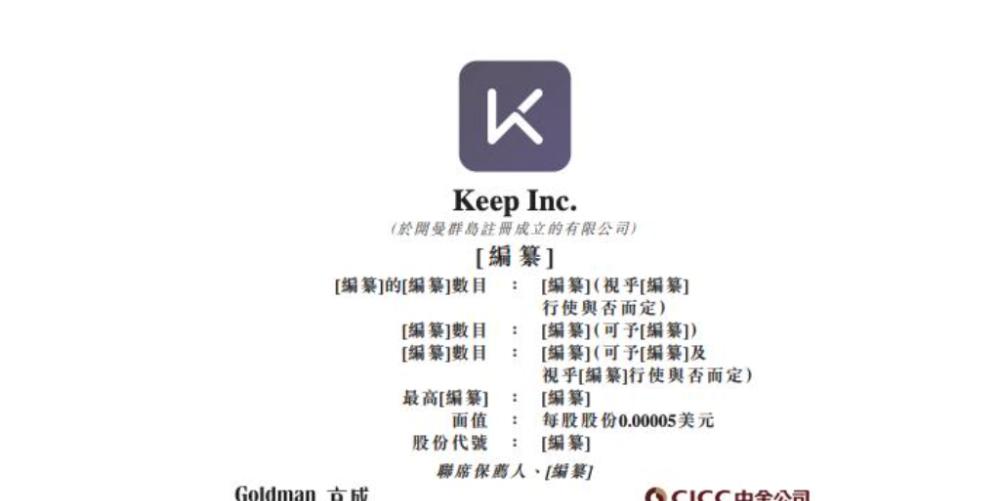On the evening of February 25, sports technology company Keep officially submitted a prospectus to the Hong Kong Stock Exchange, with Goldman Sachs and CICC as its joint sponsors of the IPO. If the listing is successful, Keep will become the "first online fitness stock" in China. According to the China Insight Consulting report, Keep is currently the largest online fitness platform in China and the world based on the number of monthly active users and the number of exercises completed by users in 2021.

Nine-month revenue of nearly 1.2 billion, an increase of 41.3% year-on-year
According to the prospectus disclosure, Keep achieved revenue of RMB663 million in 2019, RMB1.107 billion in 2020, and REVENUE of RMB1.159 billion in the nine months ended September 30, 2021, an increase of 41.3% year-on-year. In 2019 and 2020, Keep's adjusted net loss was $366 million and $106 million, respectively. For the nine months ended September 30, 2021, the adjusted net loss was $696 million.
Keep revenue includes three parts: private label product revenue, membership subscription and online paid content revenue, and advertising and other services revenue. Among them, the revenue of private label products was 396 million yuan in 2019, 637 million yuan in 2020, and 638 million yuan in the first three quarters of 2021; membership subscription and online paid content revenue was 151 million yuan in 2019, 338 million yuan in 2020, and 380 million yuan in the first three quarters of 2021, an increase of 32.8% over 249 million yuan in the same period of the previous year; advertising and other services revenue, Revenue was $116 million in 2019, $132 million in 2020 and $140 million in the first three quarters of 2021.
However, Keep is still in the red. In the first three quarters of 2019, 2020 and 2021, Keep's adjusted net loss was $366 million, $106 million and $696 million, respectively.
The average number of monthly active users in 2021 was 34.4 million
According to the prospectus, in 2020 and 2021, the average monthly active users of the Keep platform were 29.7 million and 34.4 million, respectively. The average number of monthly active users (MAUs) in the third quarter of 2021 reached 41.75 million.
Keeper is young and highly active, keeper said, with about 74.1 percent of them aged 30 or younger. Keeper is actively involved in our community, sharing training results and motivating others to get involved. In 2021, the total number of interactions in the Keep community reached 1.7 billion. Keep believes that building a community around fitness is a powerful complement to the core fitness experience, making it more motivating, competitive, and more interconnected.
In terms of shareholding, the prospectus revealed that before the IPO, Keep founder and CEO Wang Ning held 18.61%, co-founder Peng Wei held 2.26%, co-founder Liu Dong held 1.18%, co-founder Wen Chunpeng held 1.16%, GGV Jiyuan Capital held 16.14%, SoftBank held 10.39%, and other investors held 50.25%. According to public information, Keep has completed 8 rounds of financing in the 7 and a half years since its establishment, with a cumulative financing amount of more than 600 million US dollars.
Founder weight loss to create intelligent fitness platform "unicorn"
Keep was founded in 2014, and the entrepreneurial story stems from a successful weight loss experience of founder Wang Ning. Wang Ning, who graduated from the Beijing Information Science and Technology University, was once a 180-pound fat man, and in order to find a decent job and a beautiful girlfriend, he made up his mind to start losing weight. But, "for a shy college student, it is impossible to go to the gym and ask a trainer for professional guidance." ”
Wang Ning began to search a large number of information about weight loss and fitness on the Internet, after Internet learning, he mastered a whole set of fitness weight loss methods, and soon lost from 180 pounds to 130 pounds, almost everyone who saw him would ask, "How did you lose weight." Wang Ning began to think about making an APP to integrate these fitness materials and training videos. In 2014, Keep was born in the form of a public account. At the beginning of 2015, Keep launched the APP application market.
Less than three years after its launch, Keep announced in August 2017 that the number of registered users exceeded 100 million, becoming the first sports application APP in China with more than 100 million users. And during the period 2014-2016, Keep completed multiple rounds of financing, with a total financing of more than 100 million US dollars.
The sudden outbreak of the epidemic has brought obvious benefits to Keep. On the one hand, the epidemic has made people pay more attention to their own health problems, on the other hand, offline gyms have been forced to close, and Internet fitness has become an alternative choice for users. In the first half of 2020, Keep completed a $80 million Series E financing, and the post-investment valuation is reported to exceed $1 billion. Less than a year after the financing interval, Keep completed a $355 million Series F financing with a post-investment valuation of $2 billion, becoming a well-deserved unicorn in the field of sports technology.
It is worth mentioning that the industry often compares Keep and Peloton and pays close attention to the future lasting profitability of Keep. Peloton, an American startup focused on home fitness, landed on the NASDAQ in 2019. In 2020, the epidemic set off a wave of home, and Peloton's stock price soared, reaching a market value of $50 billion. But as homes in Europe and the U.S. decreased, Peloton began to lay off employees, the CEO was fired, and the stock price fell to the bottom, evaporating nearly $40 billion from its peak.
The capital market is also looking forward to Wang Ning and Keep answering how to maintain steady revenue growth.
Image source: Keep